On June 30, 2025, Brother Greg Hynes, director of the SMART-TD National Safety and Legislative Department, officially retired. While his departure left large shoes to fill, the legacy he leaves behind is one that will guide and inspire our mission for generations to come.
Brother Hynes’s decades-long commitment to SMART-TD was not just a job, it was a calling. That calling not only changed the lives of TD members, it reshaped the landscape of labor advocacy across the country.
“It’s one thing to be a railroader and complain about the conditions. It’s another thing to stand up and do something about it. That’s what I did, and it’s been the greatest honor of my life,” Hynes said.
A lifelong unionist
Greg Hynes’ journey in railroading began not just with a job but with a legacy. A fifth-generation railroader born in Winslow, Arizona, Brother Hynes hired out with Atchison, Topeka & Santa Fe Railway in Los Angeles in 1995 before transferring to Phoenix in 1997. It didn’t take long for Greg to make his mark in union leadership. By 2003, he was elected legislative representative for Local 1081 in Glendale. One year later, he became Arizona’s assistant state legislative director and ascended to state director by 2009, a position he held with distinction until he was called to serve on a national scale.
Building a national legacy: from the locomotive cab to the nation’s capital
Hynes’s contributions to SMART-TD and rail labor are monumental. After chairing the UTU Rail Safety Task Force in 2009, he was elected alternate national legislative director in 2014 and took over as national legislative director in 2019, a role to which he was re-elected in 2024. Under his leadership, the Safety and Legislative Department transformed into one of the most effective engines for labor advocacy in the nation.
He wasn’t just present in Washington, DC; he wore out the steps of the Capitol. Whether walking the halls of Congress or visiting statehouses across the country, Brother Hynes made it his mission to ensure that the voices of SMART-TD members (rail and bus alike) were heard, respected, and protected.
Perhaps no achievement shines brighter than his role in the landmark 2024 federal rulemaking mandating two-person freight crews across the United States. While many claimed credit, those who know the story understand that Greg Hynes was the unstoppable force behind that victory.
His fingerprints are also all over the push for paid sick leave for rail workers, a victory realized for 90% of the industry in no small part because of Greg’s tenacity. He was instrumental in championing the 2024 REEF Act, guaranteeing equitable treatment for railroaders receiving Railroad Retirement Board benefits.
These were not just policy wins. They were quality-of-life wins for his brothers and sisters.
Forging new traditions in labor advocacy
Hynes didn’t follow tradition; he created new ones. He redefined Railroad Day on the Hill from an industry event into the most powerful lobbying effort for rail labor, giving members direct access and influence in shaping policy. He also pioneered Bus and Transit Safety Day on the Hill, which immediately bore fruit in the form of stronger assault prevention regulations out of the FTA. The next event is already scheduled for this fall, a testament to the momentum Greg built.
From the Federal Railroad Administration’s RSAC to the SOFA Working Group and the Department of Transportation’s Advisory Committee on Human Trafficking, Greg’s influence radiated throughout the national transportation policy landscape.
Part of Greg’s lasting impact on this union will undoubtedly be the example he set for those brothers and sisters that will take up the mantle. Brother Jared Cassity, who served as Greg’s Deputy Director starting in 2019, said: “It has been an absolute honor and privilege to work alongside Greg for the past five years. I am grateful to him for his willingness to accept me into the office, to pass along his knowledge, and for being a good friend. There is no one I would have rather learned the intricacies of DC with than him. He has been a warrior for SMART-TD and for all working families, leaving a legacy that is sure to live on. His presence will be missed, but I congratulate him on a retirement well earned. Hopefully, there are many stages in his future.”
Cassity took over Hynes’s position as director on July 1, with former SMART-TD Michigan Safety and Legislative Director Don Roach moving into the deputy director position. More about Cassity and Roach will appear in the next issue of the Members’ Journal.
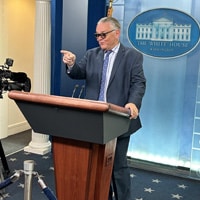

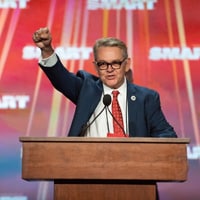
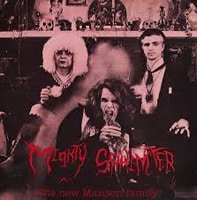
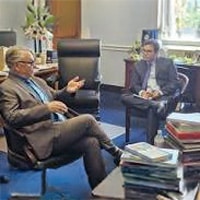
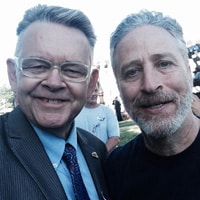


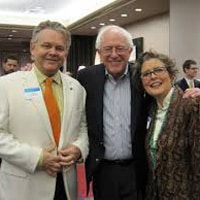
Beyond the tracks and the Hill: a renaissance man
Greg Hynes is more than a labor leader; he’s a renaissance man. A talented actor and musician, Greg has been featured in multiple plays, working as an actor in productions all across Arizona. As an actor, Brother Hynes saw the same kind of success we witnessed him have as a Safety and Legislative director. Hynes starred in off-Broadway productions of Steven Sondheim’s Into the Woods and Assassins, along with many other plays. He once took the stage as Colonel Jessup in A Few Good Men, channeling Jack Nicholson with grit and charisma. It wasn’t just the railroads that couldn’t handle the truth Hynes was bringing to that production. In his theater career, he was nominated for Best Actor and Best Supporting Actor multiple times, and won awards for Best Production as well as Best Director.
Before he ever wore the blue collar of the rails, he was known as Mr. Wonderful, pounding out rhythms on his drums, belting out vocals, and filling clubs with the raw energy of punk rock. He was a fixture in bands such as the Teds, Jodie Foster’s Army, the Skeletones, and the legendary Mighty Sphincter.
Greg found success with all of his bands in the thriving punk scene of Phoenix in the 80’s and 90’s, but with the Mighty Sphincters, he hit it big. They opened shows for Social Distortion and The Dead Kennedys and have influenced the likes of Alice Cooper, Marilyn Manson, White Zombie and GWAR.
To many outside our union, Greg is known as the guy who stole the show with hard-hitting, relentless rhythms at a concert or a scene-stealing performance on the theater stage. To us at SMART-TD, he’s known simply as the best damn Safety and Legislative Director in rail labor history.
To those who worked closely with him, Greg’s greatest legacy is one of professionalism and humble leadership, an idea that Safety & Legislative Department Chief of Staff Jenny Miller emphasized to SMART News.
“Greg’s humility and kindness stood out in Washington. Even as one of the most influential lobbyists on the Hill, he never considered himself to be above anyone else,” explained Miller, who served in her role during Brother Hynes’ tenure and beyond. “Whether interacting with the lowest member of the office staff or a sitting U.S. Senator, Greg treated both with the same level of respect. That’s a special quality of his that I personally admire and one that will be missed by everyone who’s had the honor of working with him. Even though Greg accomplished more in this role than anyone in the history of SMART-TD, I’ll always think of him first and foremost as my friend.”
An icon in work boots and windbreakers
Brother Hynes’ unconventional approach has made him unforgettable. Take, for example, the October 2024 TD Board of Directors meeting in Houston, Texas. Officers were asked to wear sports coats in a rare dress code moment for SMART-TD. Hynes, a proud son of Arizona, walked in confidently wearing a Phoenix Suns windbreaker. When questioned on it, his answer was as classic as it was logical: “I don’t understand the problem. This is a jacket, and basketball is a sport.”
That’s Greg in a nutshell: clever, principled and impossible to pigeonhole.
A legacy that will echo for generations
As he stepped into retirement, SMART-TD saluted Greg Hynes for a career of relentless advocacy, fearless leadership and boundless originality. He reimagined what this union could be and then worked hard enough to make it real. His humor, drive and sincerity made him not only a powerful advocate but a beloved brother to us all.
As President Jeremy Ferguson put it, “Greg Hynes accomplished what few have done in our union’s history. He secured landmark legislative victories and set a new standard for rail and transit safety. His work has directly improved the lives of our members and their families for generations to come. Two things are certain. Greg will absolutely be missed around here, and he will never be forgotten in this union or anywhere else he goes.”
 OLYMPIA, Wash. (AP) – Gov. Jay Inslee signed into law Thursday a measure that attempts to improve the safety of oil transportation as a sharp increase in trains carrying volatile crude oil poses new safety and environmental risks in the state.
OLYMPIA, Wash. (AP) – Gov. Jay Inslee signed into law Thursday a measure that attempts to improve the safety of oil transportation as a sharp increase in trains carrying volatile crude oil poses new safety and environmental risks in the state. Think hybrids that go 60 miles on a gallon are efficient? Trains can go eight times as far with 2,000 pounds in their backseat. And they’re only getting smarter.
Think hybrids that go 60 miles on a gallon are efficient? Trains can go eight times as far with 2,000 pounds in their backseat. And they’re only getting smarter.